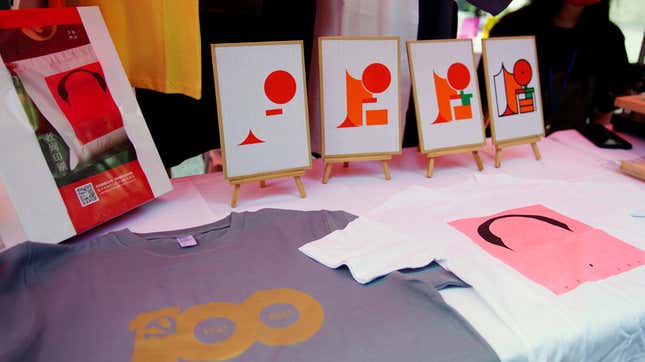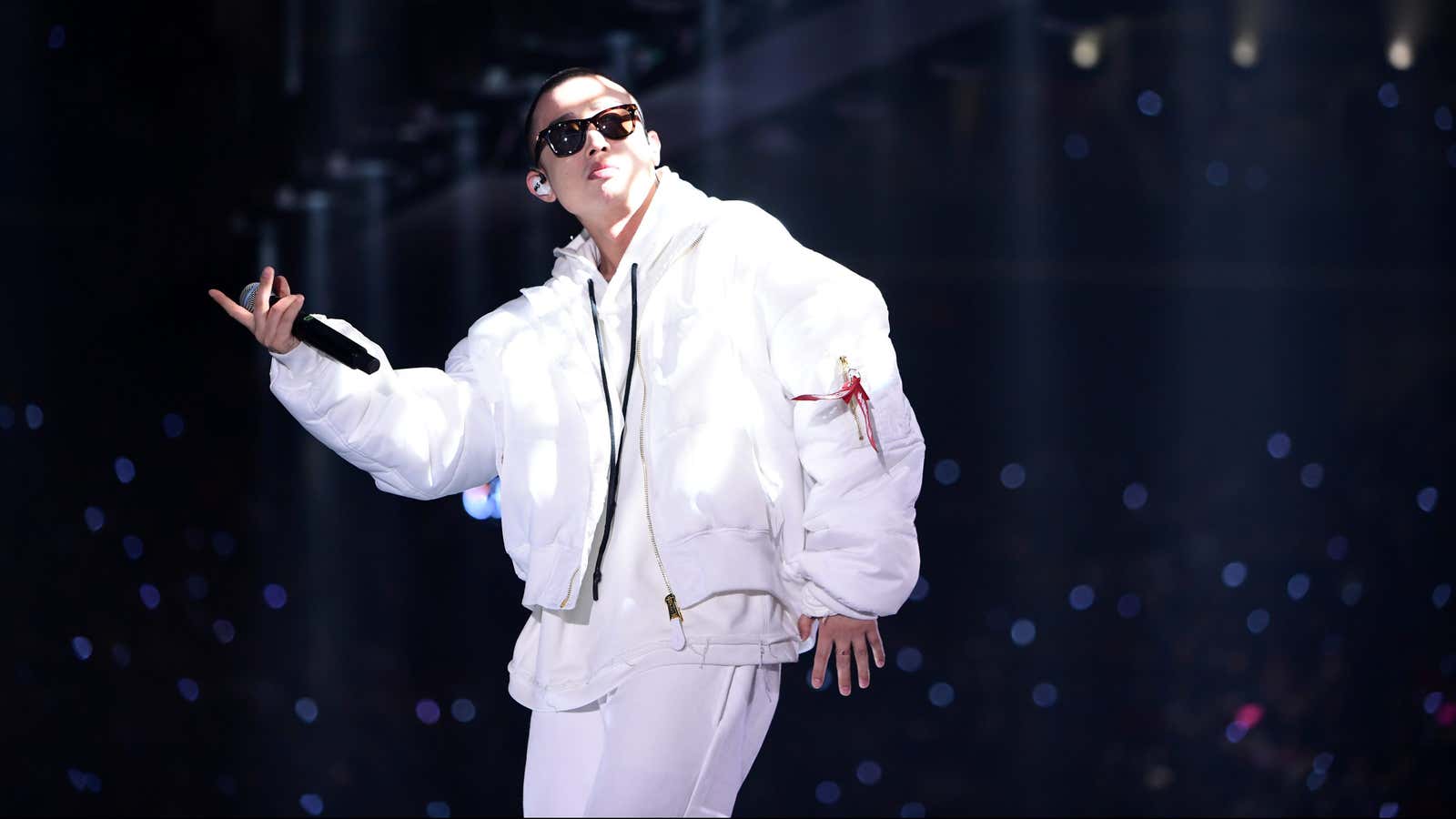China’s rap scene is active, with dozens of rappers generating billions of streaming views and being worshiped as celebrities. But in exchange for the authorities’ approval to survive, rappers not only have to avoid taking the anti-establishment stances that has always characterized rap—they also have to occasionally churn out triumphant lyrics that praise the greatness of the motherland.
On Sunday (June 20), a Chinese hip-hop brand released a patriotic rap song with the participation of 100 Chinese rappers. Titled 100%, the song consists of various lines sang by the rappers, who applauded the Chinese Communist Party’s achievements in celebration of the 100th anniversary of its founding on July 1, 1921. “…the lyrics have shown the patriotic spirit in every rapper. The co-production and performance of the song by 100 music professionals may be a pioneering act in global music history,” wrote Hip-hop Fushion, the brand that developed the song, on its Weibo page.
The musical merits of the song are certainly open to discussion. But what’s less up for the debate is the enormous difference between Chinese rap music and that in the US, where the music genre first emerged in the 1970s as an expression of Black youngsters’ anger over racism and poverty. Rap in China, however, has been swiftly and rapidly co-opted by the Party, drifting further and further away from the genre’s defiant roots.
“Rappers have understood that they have to pay lip service to the Party occasionally if they want to continue hitting the mainstream,” Nathanel Amar, director of the French Centre for Research on Contemporary China in Taipei, who studies China’s popular music, told Quartz.
In 100%, the rappers passionately celebrate the rise of China.
“From extreme poverty to radiant, I have no regret to be born in China, new high-speed trains, new ports, new looks, and a new story, go China, let’s rejuvenate the great nation,” says one set of lyrics. In another verse, a singer touts the country’s growing power: “[We are] not afraid to be compared with others, we have already taken the lead, we got money in the bank…rushing to the world to stay at the top.”
Beijing’s co-optation of rap
Before 2017, rap music was largely underground in China, performed by bands at live houses or clubs. During that period, underground Chinese hip-hop bands such as Beijing-based IN3 were able to produce rhymes critical of social issues, such as homelessness or mocking people who “eat out on government expenses,” a reference to state employees. But ever since president Xi Jinping took office around 2012, Beijing’s intensified crackdown in arts and dissent has led to the detainment of members of IN3, 17 of whose songs were put on a blacklist by the cultural ministry in 2015.
The effort to contain rap also led at one point to censorship of the Peppa Pig cartoon character, which had been adopted as a symbol of hip-hop culture in China, sometimes featuring in gangster-themed music videos.
Despite the silencing of underground rappers, in 2017 Chinese rap show The Rap of China finally helped the music to break into the country’s mainstream, albeit also turning it into a tamed version that is in line with the Party’s values. During the 2019 Hong Kong protests against a controversial extradition bill, a number of China’s top rappers shared posts condemning the protesters while praising the city’s police, an act that was echoed by some Hong Kong celebrities. Meanwhile, during last year’s Black Lives Matter movement that swept across the world, Chinese rappers mostly stayed quiet on the issue of racism even as peers in the US attended rallies and wrote protest songs.
“Rather than completely banning hip-hop, they [authorities] have tried to co-opt rappers to disseminate ‘positive energy,'” said Amar. The term refers to a phrase that became part of Xi era propaganda, and basically covers anything the Party is in favor of. Whether the rappers believe what they are saying or not, for example in their criticism of Hong Kong protesters, it is something that has to be “performed to let rap flourish in the mainstream,” he said.
But Amar also pointed out that some hip-hop fans don’t seem to be buying this seemingly patriotic act of the singers of 100%, with some making fun of the lyrics or calling out the artists for hypocrisy.
“The song is a confusing action of the hip-hop community. If they’d really like to celebrate the Party’s birthday, what about each of them writing 50 words on their thoughts on the 100th anniversary?” one user commented on Weibo under the song.
The 100th anniversary of the Communist Party’s founding

As China prepares on July 1 to mark the party’s founding in 1921, it has made sure dissenting voices can’t mar the Party’s version of Chinese history. In that narrative, the one-party rule of the Communist Party is vital to restoring China to its rightful place in the world, and to undoing the “century of humiliation,” or China’s suffering at the hands of foreign powers. Dwelling on unpleasantness caused by the policies of Mao Zedong, such as the famine caused by the Great Leap Forward industrial policies, or the unresolved trauma of the Cultural Revolution, an ideological civil war, is a form of “historical nihilism.”
Along with patriotic rap songs, China is marking the anniversary with commemorative coins, tee shirts, military aerial displays, floral installations, and renewed interest in historical tourism to sites associated with key Party figures as international tourism remains out of bounds due to the pandemic.
The party’s records show that it held its first congress in Shanghai on July 23, 1921, but July 1 was the date selected for marking the formal founding. It may not have actually happened on that date—some scholars suggest around November 1920 instead. Regardless, the next three decades were marked by the fledgling party’s struggle to establish itself, and an on-off civil war with the rival Kuomintang, until 1949, when the Communist People’s Republic of China was declared.
In 2019, the 70th anniversary of the country’s foundation was overshadowed by massive protests unfolding as Hong Kongers chafed against Beijing’s increasing encroachments on the territory’s autonomy. But that won’t happen this time. July 1 also marks the anniversary of Hong Kong’s return to Chinese sovereignty, as well as the one-year anniversary of the national security law that was put into effect late on June 30 last year. As a result of that law, most democracy activists are facing prosecution while protests are being banned ostensibly due to public health reasons.
It’s telling that it is in Hong Kong that rap anthems still adopt a “fight the power” attitude against the government and police brutality.
Tripti Lahiri contributed to this post.
Correction: An earlier version of this story misspelled Nathanel Amar’s first name. This has now been amended.
